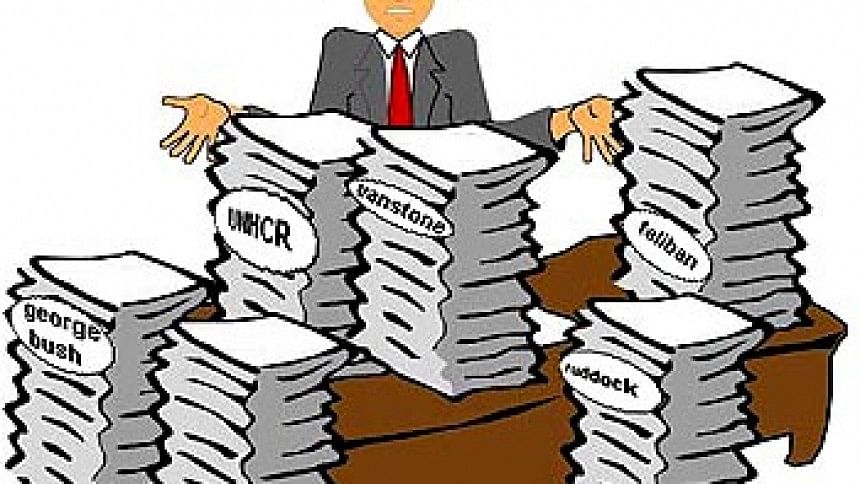The unbecoming public servant

While the prevalent wisdom seems to lay all the blame at the door of the politicians for most of our ills, if not all, this writer does not know how our discerning citizens have reacted to the indiscreet behaviour of a prime public servant of a prominent district who, on the eve of his departure on transfer, reportedly, attended 33 farewell receptions and accepted quite unabashedly expensive gifts including gold jewellery. The positive action in an otherwise disconcerting scenario is that the controlling authority has taken prompt steps to initiate disciplinary action against the defaulting official following the disclosure of the unlikely happenings in the media.
The deviance in question assumes heightened significance because quite clearly it relates to the conduct of an individual belonging to a class of persons who, constitutionally speaking, are employed in the service of the Republic and is paid out of the taxpayer's money. Of particular importance is the fact that the inappropriate conduct of such core official impinges upon the attitude and actions of junior officials and thus surely imperils the growth and nurturing of healthy service ethos.
One additional reason for dwelling on the issue needs to be spelt-out before we venture to refer to the relevant rules and regulations guiding the conduct of public servants. That reason is this writer's own and may perhaps be subscribed to by others. On a point of illustration of that reason, it is submitted that public servants are constitutionally appointed on the basis of open impartial competition and thus in their own right constitute a body of appointed representatives. Their conduct should be exemplary and definitely above reproach. In particular, the public servants in the regulatory organs of the State need to be circumspect and discreet.
From a historical perspective, one might recall the diligence and experience of key public servants of different State organs of the immediate post-partition (1947) period of the subcontinent that were largely instrumental in holding the polity together. The service calibre was demonstrably high as was expected to be. As a body it might have been zealous in the promotion of group interests but the fact remains that it also delivered significantly to the public cause.
It is worth recalling that a Member of Parliament from Chittagong has raised the issue of the mentioned public servant's improper conduct and has commented that quite a number of public servants are acting and behaving like politicians and that the pernicious trend needs to be halted. This writer does not know if the deviant officer's own service association has taken an appropriate note of the concerned officer's undesirable conduct. Their proactive role in this matter would be more than welcome in public interest.
The Civil Service Management Code of United Kingdom says "civil servants are under a duty to endeavor to deal with the affairs of the public sympathetically, effectively, promptly and withoutbias or maladministration of public money". It also adds that "civil servants must not misuse their official position to further their own, or another's, personal interests."
Coming to our own The Government Servants (Conduct) Rules, 1979 clause 5 provides as under:
Gifts - (1) Save as otherwise provided in this rule, no Government servant shall, except with the previous sanction of the Government, accept, or permit any member of his family to accept, from any person any gift the receipt of which will place him under any form of official obligation to the donor. If the offer of a gift cannot be refused without giving undue offence, it may be accepted and delivered to the Government for decision as to its disposal.
(2) If any question arises whether receipt of a gift places a Government servant under any form of official obligation to the donor, the decision of the Government thereon shall be final.
(3) If any gift is offered by the head or representative of a foreign State the government servant concerned should attempt to avoid acceptance of such a gift, if he can do so without giving offence. If, however, he cannot do so heshall accept the gift and shall report its receipt to the Establishment Division for orders as to its disposal.
(4) Secretaries to the Government, or officers of equivalent status may accept gifts, offered abroad or within Bangladesh by institutions or officials dignitaries of foreign Government of comparable or higher level provided that the value of the gift in each case does not exceed Taka 500 ( Taka five hundred). If the gift is capable of being used in a Government office or department or at official residence, it should be used, accordingly. If the gift cannot be so used, the Government servant may retain it for his own use.
Clause 7 of the conduct rules states as under:
Public demonstrations in honour of Government servants - (1) No Government servant shall encourage meetings to be held in his honour or presentation of addresses of which the main purpose is to praise him or any entertainment to be held in his honour.
(2) Subject to the provisions of any general or special order of the Government, a Government servant may attend a fare-well entertainment of a substantially private and informal character held as a mark of regard tohimself or to some other Government servant, or to a person who has recently quitted the service of Government, on the occasion of retirement from service or departure from a district or station of himself or such other Government servant or person.
Clause32 of the conduct rules says:
Contravention of rules- Contravention of any provision of these rules shall be construed as misconduct within the meaning of the Government Servants (Discipline and Appeal) Rules, 1985 and if a Government servant is found guilty of such contravention he shall be liable to disciplinary action for misconduct under the aforesaid Rules.
Finally, it may be pertinent to benefit by the wisdom and experience of a practitioner cum academic. Dr. A. M. M. Shawkat Ali, an eminent civil servant and a former advisor to the Caretaker Government, in his much acclaimed book THE LORE OF THE MANDARINS, comments that the civil service in 1972 "lost its homogeneous character which is so vital for the morale of the civil service and the element of the espirit de corps that are necessary for maintaining good working relationship and environment. The impact of such division on the concept of a homogeneous and politically neutral civil service is something which is devoutly to be wished but unlikely to be achieved in near or distant future given the trend in the quality of political leadership." (Page 277-278)
The above author laments at the unsatisfactory state of initial recruitment and post-entry requirement of improving skills and efficiency in public service and comments that "Reversalof this situation will demand very high level of maturity, vision and wisdom of the political decision makers. It will be for them to realise that it is not conducive for a strong and mature political government to have a bureaucracy about whose quality not only the recruitment agency……, but the society at large" is doubtful. He adds,"The long term consequences of the existing scenario can only lead to a stateless society." (Page 282-283)
The writer is a columnist of The Daily Star.

 For all latest news, follow The Daily Star's Google News channel.
For all latest news, follow The Daily Star's Google News channel. 






Comments